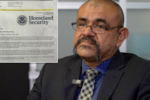In a rare and poignant moment, a Texas death row inmate has given a final interview, offering insight into his life, his crime, and his personal reflections before his execution. As he faces his last days, the inmate, who has spent years on death row, insists he is not the “monster” that some have painted him to be.
The interview comes as part of a final request from the inmate to communicate with the public before his execution. Throughout the conversation, he repeatedly challenges the perception of him as a cold-blooded criminal, shedding light on the complexities of his actions and the circumstances that led to his conviction.
The Inmate’s Message
During the interview, the inmate expressed regret for his actions, but also sought to clarify the narrative surrounding his life. “I know what I did was wrong, but I am not a monster,” he said, with evident emotion in his voice. “I’ve made mistakes, and I’ve paid for them, but I’m not who they say I am.”
This statement was not just a defense of his character, but an attempt to humanize someone who has been vilified by the media and the public. He acknowledged the gravity of his crime and the victims it affected, but also described the difficult circumstances that led to his decisions.
The Crime and Conviction
The crime for which the inmate was convicted was brutal and shocking. The details are horrific, and the case became a symbol of the controversy surrounding the death penalty in Texas. He was found guilty of murder, and after exhausting all appeals, his sentence was upheld.
Despite this, the inmate’s last interview reveals a person who has reflected deeply on the choices that led him to prison, and who recognizes the impact his actions had on others. While he does not deny his guilt, he emphasizes that his past behavior does not define him as a person.
Public Perception and the Death Penalty
The death penalty remains a contentious issue in the United States, particularly in states like Texas, where executions are relatively frequent. The case of this inmate highlights the ongoing debate about capital punishment, redemption, and whether the justice system allows for true rehabilitation.
Supporters of the death penalty argue that it is a necessary deterrent to crime, while opponents point to flaws in the legal system, including the potential for wrongful convictions. The inmate’s interview brings these issues to the forefront, as it prompts a reconsideration of how society defines guilt, punishment, and justice.
Reflections on Redemption
While many death row inmates show little remorse for their actions, this particular case is notable for the inmate’s apparent regret and desire for redemption. He spoke at length about the lessons he learned during his years in prison, particularly about the value of life and the impact of his crime on those around him.
“I’ve seen what I’ve done to people, and I know I can’t change that,” he said, his voice breaking. “But I’ve tried to be a better person. I’ve tried to help others in here. It’s not about forgiveness, it’s about making peace with who I am now.”
His words, though tragic, reflect the complex nature of the criminal justice system. Is it possible for someone to truly change? Can someone who has committed such heinous acts be redeemed, or is there a point at which their actions are too unforgivable?
The Final Moments
As the inmate prepares for his execution, he remains calm and composed, though his final words reflect the emotional weight of the situation. “I hope that somehow, some way, my story can help others,” he said. “I don’t want to be remembered for the worst thing I did in my life.”
In the end, this interview serves as a reminder of the complexities of human behavior and the moral questions surrounding the death penalty. It challenges us to think critically about how we define justice, redemption, and humanity.
For more information on the death penalty and ongoing debates, visit The Innocence Project.
Disclaimer – Our team has carefully fact-checked this article to make sure it’s accurate and free from any misinformation. We’re dedicated to keeping our content honest and reliable for our readers.








